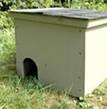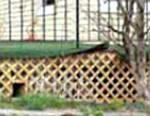|
1)
McKamey
Animal Center has funding for a FERAL CAT PROGRAM that includes
almost any cat
who is feral or was at any time a stray or litter of a stray.
2)
For
intake and adoptions, McKamey Animal Center is strictly for City of
Chattanooga dogs and cats;
their FERAL CAT PROGRAM takes cats from ALL locations including N. Georgia.
3)
McKamey is now offering Neuter and Rabies Shot for MALES,
FREE.
4)
McKamey
is now offering Spay and Rabies Shot for FEMALES at
2 cats for $25.
5)
Additional vaccines and testing are available at cost. When taking
cats in, ask about pricing for
vaccines, and Feline Leukemia (FeLV), Feline HIV (FIV) tests.
6)
 Ear-tipping
is the universal sign of a neutered or spayed feral cat. It is
always the left ear. The procedure involves removing approximately a
quarter-inch off the tip of the cat's left ear in a straight line
cut. This is done while the cat is anesthetized for spay/neutering
and healing is rapid. Ear-tipping benefits the cats by clearly
identifying them as members of a managed TNR (Trap-Neuter-Return)
colony. Many animal control organizations refrain from trapping ear-tipped cats, knowing they "belong" to someone. McKamey offers
Ear-tipping. When you arrive with your cat(s), they ask if you want
ear-tip or not. This is your option. (NOTE: Wally’s Friends in Red
Bank puts a small inkspot tattoo on the belly of the cats they s/n.
When someone goes to the trouble of catching or bringing in a stray
or feral cat, WF’s anesthesizes them and shaves them before knowing
if they’re already spayed or neutered). Ear-tipping
is the universal sign of a neutered or spayed feral cat. It is
always the left ear. The procedure involves removing approximately a
quarter-inch off the tip of the cat's left ear in a straight line
cut. This is done while the cat is anesthetized for spay/neutering
and healing is rapid. Ear-tipping benefits the cats by clearly
identifying them as members of a managed TNR (Trap-Neuter-Return)
colony. Many animal control organizations refrain from trapping ear-tipped cats, knowing they "belong" to someone. McKamey offers
Ear-tipping. When you arrive with your cat(s), they ask if you want
ear-tip or not. This is your option. (NOTE: Wally’s Friends in Red
Bank puts a small inkspot tattoo on the belly of the cats they s/n.
When someone goes to the trouble of catching or bringing in a stray
or feral cat, WF’s anesthesizes them and shaves them before knowing
if they’re already spayed or neutered).
7) Located
at McKamey Animal Care & Adoption Center,
4500 N. Access Rd., Chattanooga, TN 37415,
just across the dam off Hwy 153 in Hixson, directly across from the
main entrance into Dupont on Access Road. Phone: 423-305-6500. Web:
www.MckameyAnimalCenter.org. When you arrive in the parking lot,
the building looks like this:

There are two main entrances, each with a sidewalk.
The one on the right with the sidewalk and elevated roof (toward
center of this picture) is for adoptions. The one on the left,
beyond the flagpole, is for intake. In the grass, about 10 feet to
the right of the LEFT entry is a door marked
Day Surgery. There’s a
small doorbell. This is the dropoff and pickup for the McKamey Feral
Cat Program.
8)
Amy Osborne is McKamey’s Feral Cat Program Coordinator:
423-305-6500 phone for twice weekly connection, or email
feralcat@mckameyanimalcenter.org for easier / daily answers
to questions or confirmation of schedule.
9)
McKamey’s Feral Cat Program Spay / Neuter service
days vary weekly, but typically are on Wednesday, Thursday, and Friday. Dropoff is 7 – 8 am, although dropoff can be as
late as 9 am for a difficult to capture cat. Pickup is 4 – 5 pm same
day, or possibly after 5 with proper arrangements. Contact Amy or
TamiFreedman@aol.com
423-591-3354 who is working with ferals in Catoosa County for
confirmation on schedule.
10) McKamey
does NOT have the capacity to re-home or re-locate feral or stray
cats. This free and nearly free Spay/Neuter service is offered to
colony caretakers and stray cat owners for the purpose of keeping
their own cat population under control.
11) Animals
Traps are available for purchase at Home Depot, Lowes and Tractor
Supply in the $40-50 range and up. With a $50 deposit, you can
"lease" a trap from McKamey, and your deposit returned when the trap
is returned. In Catoosa County, the group, Catoosa Citizens for
Animal Care (CCAC) has a limited number of traps for public
availability. Contact
Amy or TamiFreedman@aol.com
423-591-3354.
McKamey
allows cats to be brought in via Cat Carriers or Traps. When working
with an animal trap, start by covering the bottom with newspaper and
putting a large towel, blanket or sheet over the trap, giving the
animal a secure feeling inside. And tuna or wet food to entice them
in. Animals
Traps are available for purchase at Home Depot, Lowes and Tractor
Supply in the $40-50 range and up. With a $50 deposit, you can
"lease" a trap from McKamey, and your deposit returned when the trap
is returned. In Catoosa County, the group, Catoosa Citizens for
Animal Care (CCAC) has a limited number of traps for public
availability. Contact
Amy or TamiFreedman@aol.com
423-591-3354.
McKamey
allows cats to be brought in via Cat Carriers or Traps. When working
with an animal trap, start by covering the bottom with newspaper and
putting a large towel, blanket or sheet over the trap, giving the
animal a secure feeling inside. And tuna or wet food to entice them
in.
12) Cats
require little maintenance and a colony, once all are spayed or
neutered, and with adequate food, has very little expense or
effort. There is a national organization
www.alleycat.org that focuses on improving the conditions of our
stray and feral cat
 friends.
This page on the Alley Cat website:
www.alleycat.org/NetCommunity/Page.aspx?pid=431 has links on How
to Conduct a TNR (trap-neuter-return) Program, Cat Colony Care, with
additional links to Winter Weather Care:
www.alleycat.org/NetCommunity/Page.aspx?pid=701 and Feral
Cat Outdoor Shelters (over 15 with instructions):
www.alleycat.org/NetCommunity/Page.aspx?pid=631 friends.
This page on the Alley Cat website:
www.alleycat.org/NetCommunity/Page.aspx?pid=431 has links on How
to Conduct a TNR (trap-neuter-return) Program, Cat Colony Care, with
additional links to Winter Weather Care:
www.alleycat.org/NetCommunity/Page.aspx?pid=701 and Feral
Cat Outdoor Shelters (over 15 with instructions):
www.alleycat.org/NetCommunity/Page.aspx?pid=631
13) WHILE
SUPPLIES LAST!– McKamey’s grant monies may run
out so please work ON THIS IMMEDIATELY to get your feral colony
under control -- right now!
14)
Cats normally go into heat during early spring and then again later
in summer. From fall until approximately March, we have the
opportunity to get our stray cats under control! McKamey has
Pediatric Vets who can spay / neuter kittens from 2 lbs up. This is
approximately 8 weeks. The mother should have stopped nursing prior
to bringing her in. McKamey can spay a cat in heat or a pregnant
cat, thereby stopping the pregnancy. (These at no additional
charge).
15)On
day of surgery, it’s recommended the cat not have food or water from
midnight onward. When catching a feral, sometimes it’s necessary to
put food in the trap to catch, however please remove the food
quickly from the cage and go ahead and bring the cat on in. Tami’s
comment:
When I started with my colony, I caught the first cat early the
night before the surgery. This required me to keep a feral cat caged
for 12-14 hours before transport, causing me and the cat much
unneeded grief. Since that time, I now work to catch the animals
very early the morning of the surgery so I’m almost immediately
transporting to McKamey. (Catching them at their normal eating time
is easiest, and sometimes moving their eating time toward 7 in the
morning, makes the morning capture easier). Then, after the surgery,
I take the cat home and bring it inside, leaving the feral inside
the cage, placed on newspaper. I then add wet food and water to the
cage. The cat is woozy at 5pm, so releasing at that time leaves it
vulnerable to predators and other cats. I often leave the cat in the
cage until early morning, then carry the cage/cat outside to release
cat where trapped. (Some cats are frenetic inside or are clearly
recovered, and I may return them at 8 or 9 pm onward).
16) Anyone
can participate in this program. In Catoosa County, Tami Freedman
(423-591-3354,
TamiFreedman@aol.com) is working with people who might need
additional help beyond this information, including animal traps, and
possible help with capture. In rare instances, we can help with
transport for those with limited transportation. For those with
limited income, the group Catoosa Citizens for Animal Care (CCAC,
www.CatoosaCitizensForAnimalCare.org) is also often
able to offer some financial aid. Ask Tami, or contact them directly
at 706-937-2287 or
CatoosaAnimal@gmail.com.
|